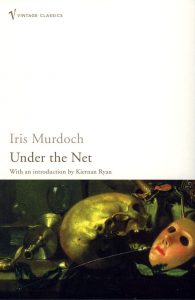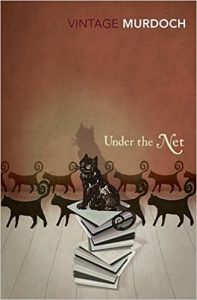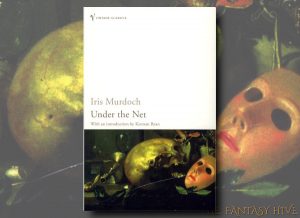UNDER THE NET by Iris Murdoch (BOOK REVIEW)
“We all live in the interstices of each other’s lives, and we would all get a surprise if we could see everything.”
 Under The Net (1954) is Iris Murdoch’s first novel, and it immediately established her as an important literary figure. It was published as literary fiction, and Murdoch is generally considered a literary writer, her work certainly cannot be contained by mere realism. Under The Net tells the picaresque misadventures of Jake Donaghue, a writer who ekes out a living on translations and sponging off his friends in London. So why am I writing about it for a genre fiction website? Under The Net is the story of how Jack falls under the influence of the mage-like figure of Hugo Bellfounder, and shifts between sequences around the pubs of London and more phantasmagorical sequences in which reality seems to merge with plays, mime displays, or film sets. At times Jake seems to fall into an almost surreal dreamworld. So I could argue that it works as a work of fantastika, a work of fiction that at the very least has a porous sense of reality and draws on much of the feel of fantasy. But additionally, Under The Net is a work of fiction about language and how language constructs reality. All of Jake’s misadventures come about because of how his vision of reality fails to match up to other people’s, how communication is inherently fraught. As much as any Philip K. Dick character, Jake lives in a reality divorced from consensus reality. The net in Murdoch’s title is the net of language itself, which her characters struggle to escape and communicate clearly between each other. As such, I would also argue that Under The Net is a work of speculative fiction that engages with ideas about language as a technology to shape reality.
Under The Net (1954) is Iris Murdoch’s first novel, and it immediately established her as an important literary figure. It was published as literary fiction, and Murdoch is generally considered a literary writer, her work certainly cannot be contained by mere realism. Under The Net tells the picaresque misadventures of Jake Donaghue, a writer who ekes out a living on translations and sponging off his friends in London. So why am I writing about it for a genre fiction website? Under The Net is the story of how Jack falls under the influence of the mage-like figure of Hugo Bellfounder, and shifts between sequences around the pubs of London and more phantasmagorical sequences in which reality seems to merge with plays, mime displays, or film sets. At times Jake seems to fall into an almost surreal dreamworld. So I could argue that it works as a work of fantastika, a work of fiction that at the very least has a porous sense of reality and draws on much of the feel of fantasy. But additionally, Under The Net is a work of fiction about language and how language constructs reality. All of Jake’s misadventures come about because of how his vision of reality fails to match up to other people’s, how communication is inherently fraught. As much as any Philip K. Dick character, Jake lives in a reality divorced from consensus reality. The net in Murdoch’s title is the net of language itself, which her characters struggle to escape and communicate clearly between each other. As such, I would also argue that Under The Net is a work of speculative fiction that engages with ideas about language as a technology to shape reality.
The novel begins with Jake being kicked out of his friend Madge’s flat. Madge is getting married, and so is clearing her deadbeat friend out of her space. Looking for a new place where he can live in style without paying any rent, Jake chances across old flame Anna, who brings Jake back into the orbit of charismatic philosopher Hugo Bellfounder. Jake has been avoiding Hugo after publishing a philosophical tract The Silencer based on Hugo’s ideas, but soon Jake finds himself under Hugo’s incredible influence again. As Jake is drawn back in, he begins to suspect that Hugo, Anna and himself are at the centre of a convoluted and sinister plot. Jake might even have to sober up in order to get him and all his friends out of this particular mess.
Central to the novel is Hugo’s distrust of language, the idea that language is an inherently flawed mode of communication because it can only symbolise, and hence removes the speaker and the listener form the thing they are talking about. As Hugo argues through Jake’s The Silencer:
“the movement away from theory and generality is the movement towards truth. All theorising is flight. We must be ruled by the situation itself and this is unutterably particular. Indeed it is something to which we can never get close enough, however hard we may try as it were to crawl under the net.”
The irony of a writer using the written word to explore this idea runs throughout the book. Jake, like Murdoch herself, makes his living off of writing, he is a master of words. Yet, he is constantly failing to communicate. The plot is driven by Jake’s overhearing of various rumours, snippets of conversation and things people have told him, none of which are untrue but because Jake does not see the full picture he jumps to the disastrously wrong conclusion every time. Thus the words themselves can be true whilst the sense of what being said is quite different. When we are all experiencing our own perspectives on reality, and we are using inaccurate terms to try and convey this reality to others, communication will always be difficult.
 Modes of communication that rely on other languages run throughout Under The Net. Jake encounters Anna as part of a mime troupe performing in an empty theatre, a performance inspired by Jake’s interpretation of Hugo’s philosophy. When Jake finally meets Hugo again, it is on a television set of ancient Rome, which soon descends into a very real brawl. Whilst crawling London’s pubs, Jake bumps into the leader of the New Independent Socialist Party, and has a spirited discussion about socialism and activism. But in the end, theatre, television and politics prove equally limited tools for which to communicate the truth of the world.
Modes of communication that rely on other languages run throughout Under The Net. Jake encounters Anna as part of a mime troupe performing in an empty theatre, a performance inspired by Jake’s interpretation of Hugo’s philosophy. When Jake finally meets Hugo again, it is on a television set of ancient Rome, which soon descends into a very real brawl. Whilst crawling London’s pubs, Jake bumps into the leader of the New Independent Socialist Party, and has a spirited discussion about socialism and activism. But in the end, theatre, television and politics prove equally limited tools for which to communicate the truth of the world.
There are a number of powerful and memorable sequences throughout the novel which feel very much like fantasy. These are moments of transcendence, in which Murdoch explores how strange the world really is. In one sequence, Jake and his friends go swimming in the moonlit Thames. In another, Jake searches for Anna in Paris, and becomes lost in a ghostly forest of statues. In the scenes set in the theatre and the television set, reality takes on the permeability associated with those forms, as it becomes increasingly difficult to unpick what is prop and performance and what is reality. Murdoch’s sharp sense of humour runs through the book as well, and she delights in pushing Jake’s various misadventures right to the edge of the ridiculous – there’s a particular bit where Jake and his friends try to steal an acting dog from an expensive flat. No particular event in and of itself is quite bizarre or ridiculous enough to completely destabilise Under The Net’s sense of reality, but the combined effect is that this is all happening in a heightened world where the boundary between dream and reality is perhaps not as stable as we are used to.
Under The Net is an incredible accomplishment for a first novel. Murdoch’s exquisite prose and deft characterisation mix with philosophical explorations of language and reality to create a read that is as compelling as it is thought-provoking. Whether or not in the end we decide it can or can’t be read as fantasy or speculative fiction, it nevertheless demonstrates how the concerns of speculative fiction and the motifs of the fantastic extend across genre boundaries, and how literature is enlivened and emboldened by them.

